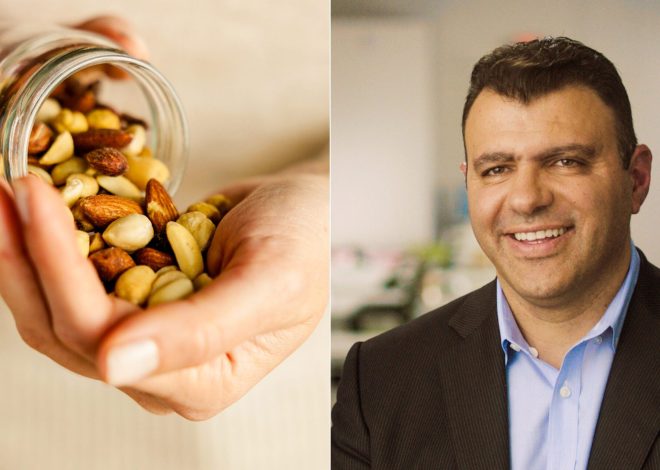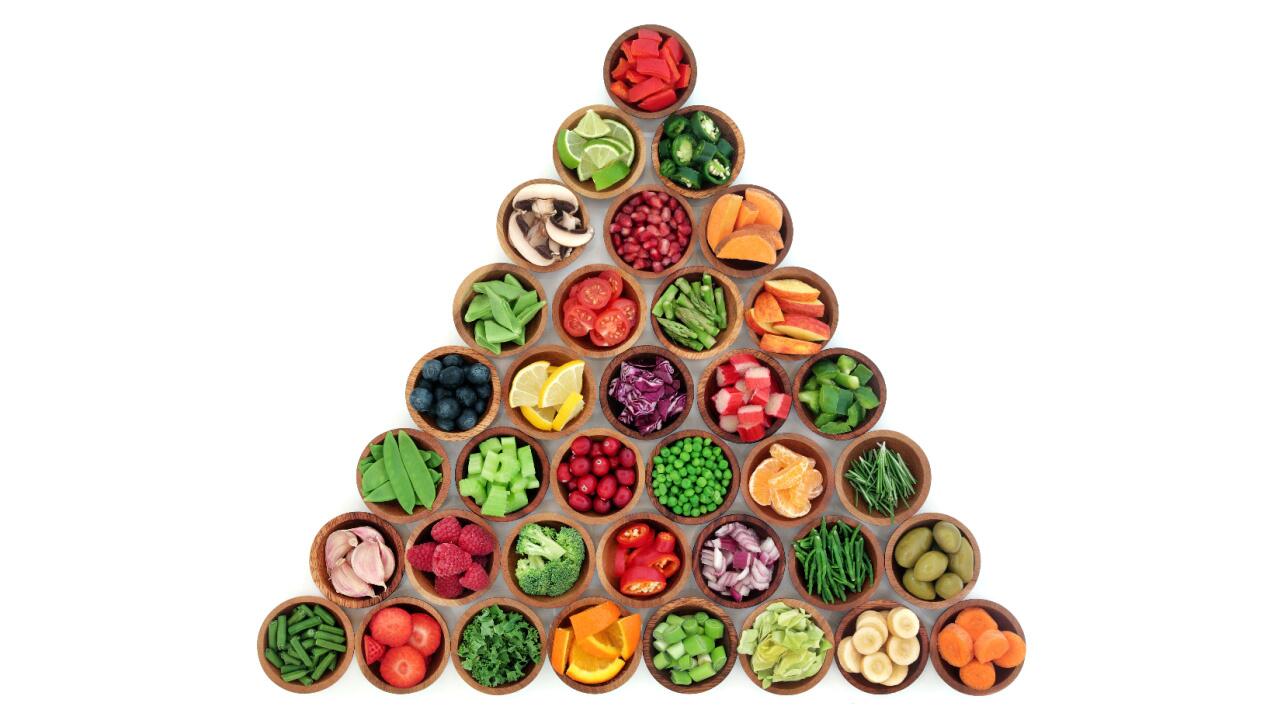
Vegan food pyramid: This is what a balanced vegan diet looks like
Author: Benita Wintermantel/editorial team (lw) | Category: Food and Drink | April 29, 2024

Photo: Shutterstock/marilyn barbone
The vegan food pyramid shows how an animal-free diet can work in a balanced manner and without nutrient deficiencies. We explain the structure of the vegan food pyramid – it shows which nutrients are important in a plant-based diet.
- The vegan food pyramid helps vegans with a balanced and healthy diet.
- Legumes such as peas, beans and lupins are important for optimal nutrition with a vegan diet.
- Make sure you get enough vitamin B12, calcium and omega-3 fatty acids. Vitamins B2 and D as well as the minerals iodine and zinc are also often neglected.
A food pyramid shows which foods you should eat and in what quantity for a balanced diet: In the broad base you can find the foods that you can eat a lot of – in the narrow top you can find the foods that you can only eat sparingly should consume.
The classic food pyramid includes dairy products, eggs, meat and fish. For people who follow a vegetarian or vegan diet, there are special food pyramids for vegetarians or vegans.
Vegan food pyramid: Eat a balanced, animal-free diet
Animal protein is replaced by legumes, seeds and nuts in the vegan food pyramid. Instead of animal fat, the vegan food pyramid recommends vegetable oils and fats.
Nevertheless, a healthy diet is a little more demanding if animal ingredients are completely eliminated: Vegans should therefore tailor their menu specifically in a few critical points. Because with dairy products and eggs, nutrients are lost from the food pyramid, which cannot be easily compensated for – in two cases not at all – by plant foods. There are risks here that should not be overlooked.
The vegan food pyramid helps here. It clearly shows how you can eat a balanced and healthy diet on an animal-free diet and how many portions from the different food groups should be on your menu:
The 6 levels of the vegan food pyramid
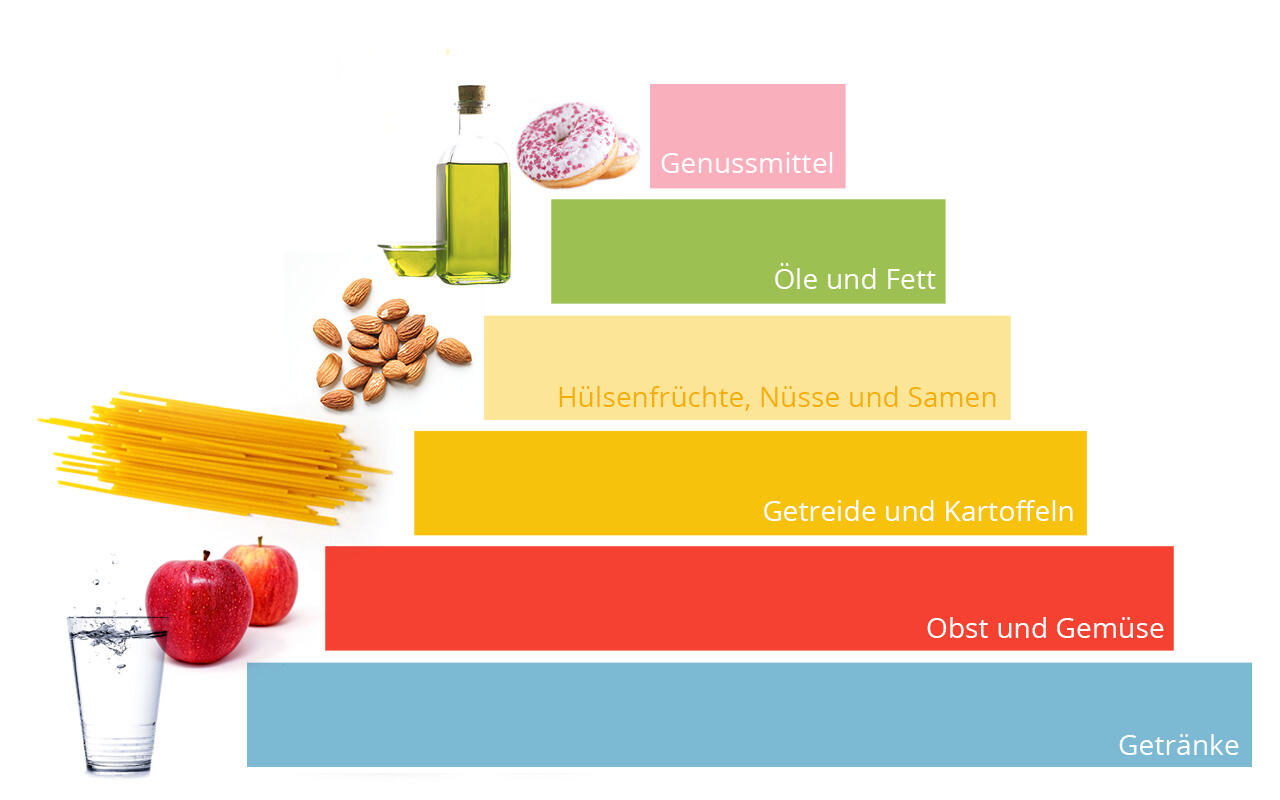
The six levels of the vegan food pyramid: 1) drinks, 2) fruits and vegetables, 3) grains and potatoes, 4) legumes, nuts and seeds, 5) oils and fats, 6) luxury foods. (Photo: Pexels/Dominika Roseclay, Polina Tankilevitch; Pixabay/Alexas_Fotos, Boris Trost, Marge Nauer; Unsplash/hannah mn (all CC0))
1st level: drinks
Drinking a lot is important – regardless of whether you follow a vegan diet or eat animal products. The recommendation here is: Drink water, unsweetened tea and highly diluted fruit juices.
Anyone who avoids milk and dairy products can have problems with their calcium supply. An alternative is mineral water containing calcium. The water should contain more than 400 milligrams of calcium per liter.
- Recommendation for vegans: You should drink 1 to 2 liters of fluid daily, even with a vegan diet.
2nd level: fruits and vegetables
Fruit, salad and vegetables are the most important sources of nutrients for vegans. Dark green vegetables such as kale, broccoli, fennel and lamb’s lettuce contain a lot of calcium, which is important for vegans.
- Recommendation for vegans: 3 servings of vegetables (400 grams) and 2 servings of fruit (300 grams) daily.
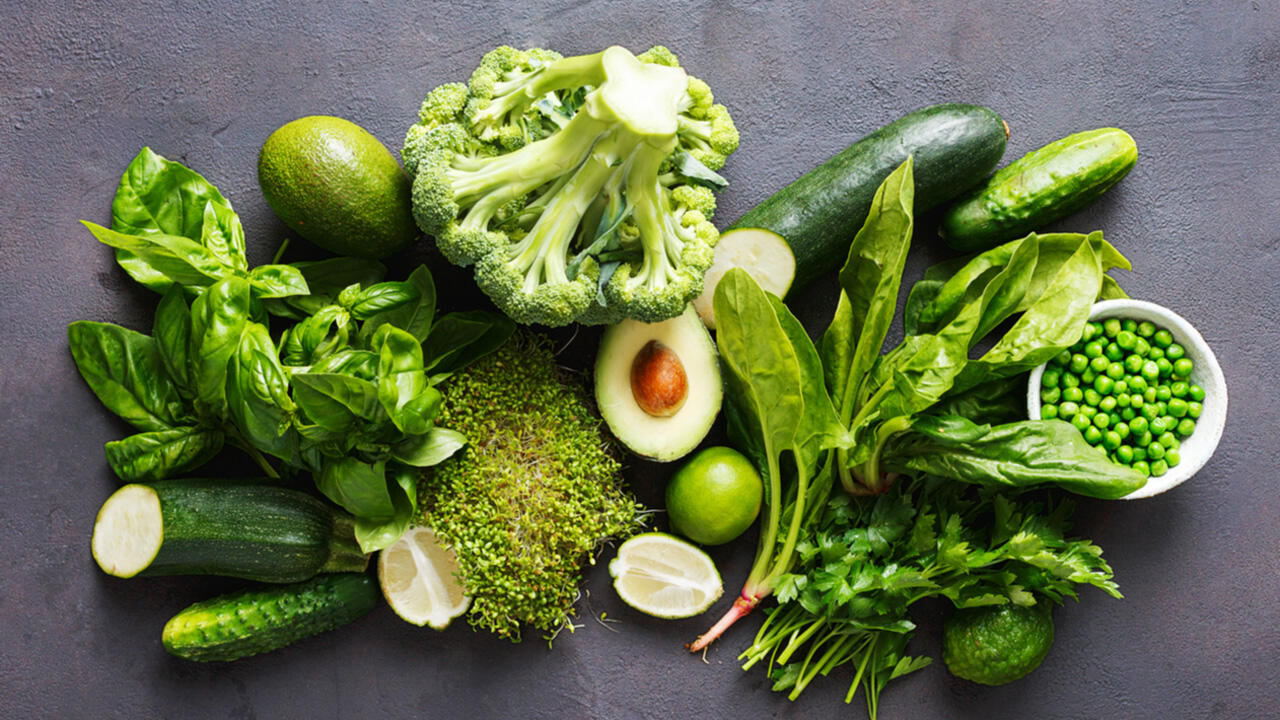
Green vegetables can contribute to calcium supply. (Photo: Shutterstock/KucherAV)
3rd level: grains and potatoes
Cereals, pseudo-cereals, rice and potatoes contain minerals, vitamins and fiber – and keep you full for a long time. Whole grain products are particularly recommended. When it comes to pasta, vegans should pay attention to egg-free products.
- Recommendation for vegans: 4 servings of grains and potatoes daily.
4. Level: legumes, nuts, seeds
Legumes are important sources of protein, nuts and seeds also provide protein, but also vitamins, minerals and healthy fatty acids.
- Recommendation for vegans: 30 to 60 grams of nuts and seeds as well as 3 servings of legumes, soy products and plant drinks daily.
5th level: oils and fats
If you use the right oils, you will provide your body with important nutrients. It is best to use high-quality, cold-pressed oils.
Flaxseed, rapeseed oil and walnut oil are particularly healthy because of the omega-3 fatty acids they contain.
- Recommendation for vegans: 2 to 4 tablespoons of oil daily.
6th level: sweets, snacks and alcohol
The top level of the vegan food pyramid is the only level that contains foods that the body does not need. Sweets, cakes, chips and ready meals are occasionally allowed, as is small amounts of alcohol. The less you consume of these products, the better.
- Recommendation for vegans: no more than one serving per day.
All recommendations are intended as daily guidelines – but that does not mean that you have to consume these amounts every day. If the weekly average is right, you will automatically provide your body with everything it needs.
Essential nutrients for vegans
Anyone who eats a purely plant-based diet must make sure that they consume enough nutrients. Particularly important for vegans: vitamin B12, calcium and omega-3 fatty acids, as well as vitamins B2 and D, iodine and zinc.
Vitamin B12: This is how vegans prevent a deficiency
The most explosive element here is vitamin B12, which is hardly found at all in plant-based foods. This vitamin deficiency often goes unnoticed at first because the organism can use its B12 stores for several years.
But inevitably the moment comes when the vitamin – which is needed for cell division and blood formation – begins to be missing.
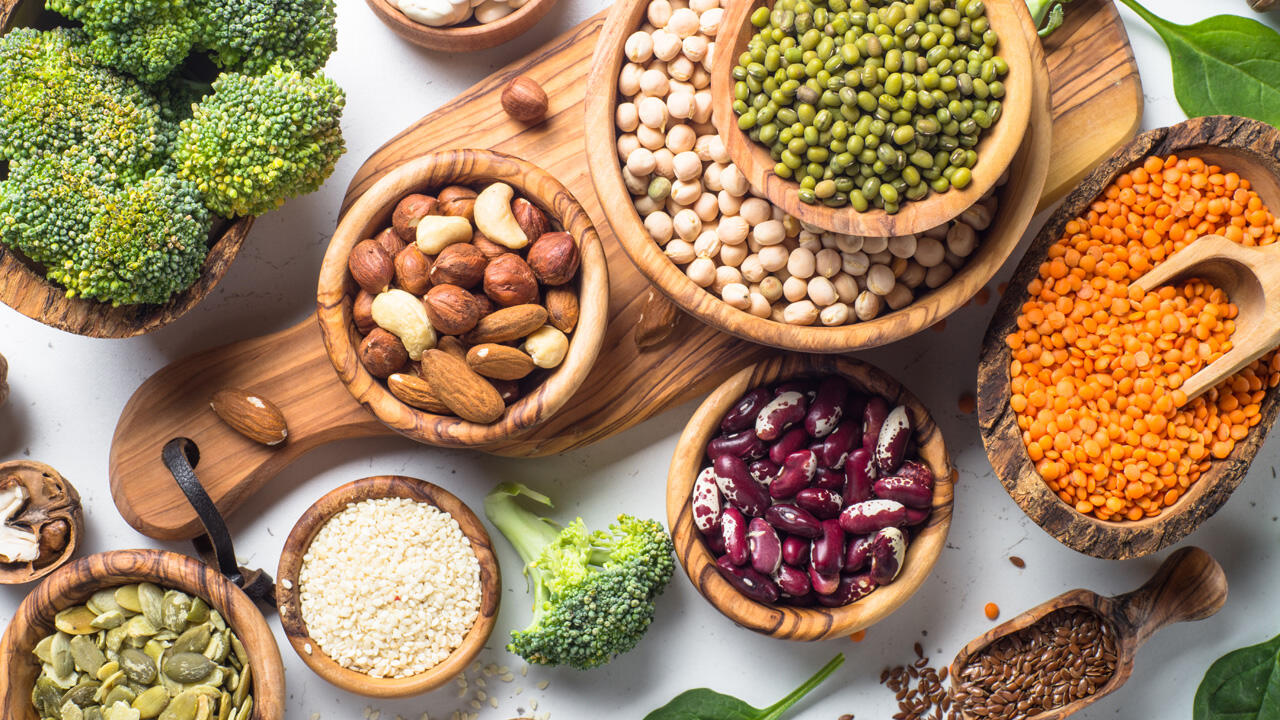
Legumes are an important part of a vegan diet. (Photo: Shutterstock/nadianb)
The nutrition organization ProVeg, which advocates plant-based nutrition, advises vegans to supplement B12: through dietary supplements and also in the form of fortified foods or B12 toothpaste.
Vegans should also have their blood values checked by their family doctor once a year, including the so-called Holo-TC values as the earliest indicators of a deficiency.
Calcium: This is how vegans get the best possible nutrition
Second critical point for vegans: Calcium. The body needs the mineral for stable bone structure. Even mixed food eaters often find it difficult to achieve the daily intake of 1,000 mg (for adults) recommended by the German Nutrition Society (DGE). Vegans often miss this benchmark – sometimes even significantly.
There are sufficient plant sources of calcium available: dark vegetables such as kale, spinach, broccoli and pak choi, as well as almonds and legumes. Sesame tahini also contains a lot of calcium, although its bioavailability is low.
Also useful: incorporating a fortified plant milk – e.g. soy milk or oat milk – into your diet and/or drinking calcium-rich mineral water (400 mg/l).
Omega-3 fatty acids: recommendations for vegans
That still leaves problem area number three: the long-chain ones Omega-3 fatty acids EPA and DHAwhich occur primarily in marine fish and which the organism can hardly obtain from plant food.
These so-called fish oils are said to have positive effects on the immune system, the inhibition of inflammatory processes and the development of the nervous system. Although the average population does not receive optimal care, vegans often fall far short of the recommendations.
ProVeg recommends consuming enough linseed oil and rapeseed oil, linseeds and walnuts, which provide omega-3 fatty acids. If you want, you can supplement additionally: Certain microalgae are rich in DHA and EPA and are offered as dietary supplements in the form of microalgae oils.
Other important nutrients for vegans
Vegans often miss out too Vitamin B2, Vitamin D as well as the minerals iodine and Zinc. However, this is no less the case with mixed food eaters and can be easily controlled through a targeted diet:
- high in zinc are whole grains, legumes and nuts.
- For an extra serving iodine Vegans should use iodized table salt and possibly supplement this with seaweed with a moderate iodine content (e.g. nori).
- Good sources of vitamin B2 are whole grains, almonds, broccoli or mushrooms.
- Finally, vitamin D is essential for calcium absorption and is therefore doubly important for vegans. The body produces a large part of the vitamin D it needs through the skin itself using UV radiation. Therefore: go outside for at least 30 minutes every day – and hope that the sun shines.
Read more on oekotest.de:
![]()

Ethel Purdy – Medical Blogger & Pharmacist
Bridging the world of wellness and science, Ethel Purdy is a professional voice in healthcare with a passion for sharing knowledge. At 36, she stands at the confluence of medical expertise and the written word, holding a pharmacy degree acquired under the rigorous education systems of Germany and Estonia.
Her pursuit of medicine was fueled by a desire to understand the intricacies of human health and to contribute to the community’s understanding of it. Transitioning seamlessly into the realm of blogging, Ethel has found a platform to demystify complex medical concepts for the everyday reader.
Ethel’s commitment to the world of medicine extends beyond her professional life into a personal commitment to health and wellness. Her hobbies reflect this dedication, often involving research on the latest medical advances, participating in wellness communities, and exploring the vast and varied dimensions of health.
Join Ethel as she distills her pharmaceutical knowledge into accessible wisdom, fostering an environment where science meets lifestyle and everyone is invited to learn. Whether you’re looking for insights into the latest health trends or trustworthy medical advice, Ethel’s blog is your gateway to the nexus of healthcare and daily living.



